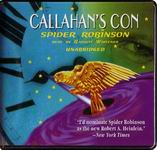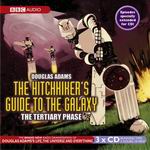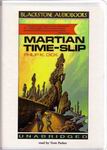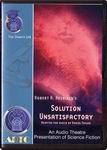
 Callahan’s Con
Callahan’s Con
By Spider Robinson; Read by Barrett Whitener
8 CDs – Approx. 10 Hours [UNABRIDGED]
Publisher: Blackstone Audio
Published: 2004
ISBN: 0786183470
Themes: / Science Fiction / Humor / Crime / Time Travel / Immortality / Telepathy / Florida /
Jake Stonebender, our favorite intergalactic barkeep, rivets us to our stools with yet another wild and wooly yarn about the goings on of his Key West cantina. This time though, it isn’t the end of the world that is the trouble. Instead, it’s a mountainous mole-hill of a thug named Tony Donuts Jr. who wants to make his bones by fleecing Jake and his neighboring businesses for “protection money”. Jake could solve this problem with straight-on firepower, but that’d only bring down more government attention on him and his hippie clientele. And more heat is what he doesn’t need – because wouldn’t you know it – a dedicated bureaucrat from the Florida family services department has been sniffing around to find out why Jake’s only daughter has not been to school since she was born some thirteen years ago! So Jake and his extended family set about concocting a sting so devious it will make Florida Swampland real estate look good. The grift involves, among other things, time-travel, the Russian Mob, and the Fountain of Youth!
Full of brain-smearing puns and gawdawful song parodies Callahan’s Con is guaranteed to entertain anyone who enjoys Robinson’s Hugo award winning fiction. Myself, I come for the jokes and stay for references. In this case a nice homage to literature’s most unlucky master criminal: John Dortmunder. Callahan’s Con is proof that not only can Robinson like to write in the style of Heinlein – as he did in the previous installment, Callahan’s Key, – but also that he can write in the style of Mystery Writers Of America Grandmaster Donald E. Westlake! Interestingly this means that that Jake’s first person perspective is stretched-out to include multiple viewpoints – as is the Westlake’s Dortmunder novels. I’m not sure how Robinson did it, but he managed to convey other character’s perspectives in a way I can only describe as fictionalizing the fiction. I should also note that in a break with tradition Robinson hasn’t merely added to the seeming ever growing entourage surrounding Jake – for a major of character in the series dies. Though this could be troubling it is handled with grace and a few tears.
Reader Barrett Whitener, in this third Blackstone Audio Callahan audiobook does his familiar and fun vocal gymnastics routine – spouting off one liners in a dozen comic voices. Whitener, an Audie Award winner, is well matched with comic material – it really and truly is his forte. Blackstone Audio has been known to use a mix of art from the hardcover or paperback and their own original cover art. Their own art has been steadily improving and I’m pleased to say this is the nicest original cover so far!
Posted by Jesse Willis





